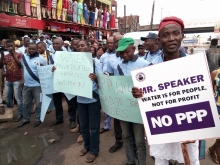In Lagos, groups demand halt to planned water privatisation

The groups – Environmental Rights Action, Public Services International (PSI), Amalgamated Union of Public Corporations, Civil Service Technical and Recreational Services Employees (AUPCTRE) and representatives of Epe, Ikorodu, Ketu, Agege and Shomolu communities staged a protest march from Ikeja under bridge to the House of Assembly, Alausa today (July 27) to deliver a petition to the Speaker.
In the petition titled "Privatisation is not solution to Lagos water problem" and presented to Hon. Obasa Mudashiru, Speaker, Lagos State House of Assembly, the groups said they were deeply worried that the Lagos State Water Corporation (LSWC), with the support of the World Bank and private water corporations, had been pushing very hard for a PPP model of water privatization that has failed in other parts of the world. The groups noted that despite the World Bank announced pull back from the project in December 2015 the Lagos government was still bent on pressing ahead with it.
They revealed that failures in water PPP models have been recorded across the globe where, as part owner of water corporations that win PPP contracts, the World Bank has positioned itself to profit from this model. They added also, that ”this conflict of interest drives the Bank’s misleading marketing, especially its promotion of key “success stories “ like Manila, Nagpur, Paris, and Dar Es Salaam that have attempted to solve water crisis with PPPs that failed and have instead rolled back water privatisation and advanced down the road of remunicipalisation".
ERA/FoEN Deputy Executive Director Akinbode Oluwafemi said: “We urge the Speaker and the entire members of the House to side with the people rather than promoters of privatization who put profits before the right to water which is upheld as a human right by the United Nations”.Comrade Sani Baba, Sub-regional secretary of PSI said: “PPP promoters in the water sector advance arguments that are tailored to dousing apprehension of workers towards the initiative but time and again, and global experience shows that workers get laid off and rate hikes follow. The Lagos House of Assembly should reject this initiative because that is the path this PPP arrangement will follow”.In the same vein, Comrade Abiodun Bakare, the state secretary AUPCTRE said: "The Lagos state government must of utmost priority ensure adequate funding for the water sector. This administration must also investigate funding that was expended on expansion of water infrastructure by the immediate past Group Managing Director of LSWC”.
- Reject all forms of water privatization and commodification.
- Revise all water sector laws that promotes PPP
- Make adequate budgetary allocations to the water sector
- Fully uphold the human right to water as an obligation of the government, representing the people.
- Integrate broad public participation in developing plans to achieve universal access to clean water.
- Reject contracts designed by, involving, or influenced by the IFC, which operates to maximize private profit.
- Disclose all IFC and World Bank activity and discussions with Lagos government officials regarding water, including formal and informal advisory roles.
- Build the political will to prioritize water for the people, therefore leading to a comprehensive plan that invests in the water infrastructure necessary to provide universal water access, which will create jobs, improve public health, and invigorate the Lagos economy.

